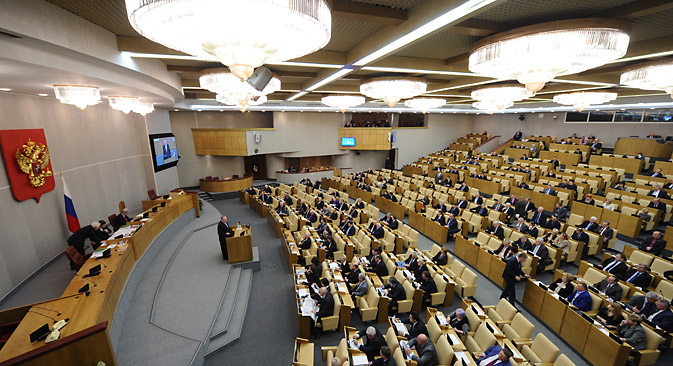
Under the bill, individuals and legal entities will be required to notify the authorities about the beginning of transmission of information on the internet. Source: Photoshot/Vostok Photo
The State Duma has passed, in its third and final reading, the “anti-terrorism package” bill, which regulates the exchange of information on the internet and, in particular, equates bloggers with representatives of mass media outlets.
Critics of the bill have expressed fears that the law is an attempt to restrict the free flow of information on the internet, and that it will be applied primarily against political bloggers. The bill has come in for especially sharp censure by Mikhail Fedotov, chairman of the Presidential Council on Civil Society and Human Rights, and the new ombudsman, Ella Pamfilova.
Bloggers to work under mass media regulations, Duma passes relevant bill
Adoption of anti-terrorist amendments won't lead to blocking of foreign Internet sites
As the authors of the bill acknowledge, it has been prepared in response to the terrorist attacks in Volgograd at the end of last year. Under the bill, individuals and legal entities will be required to notify the authorities about the beginning of transmission of information on the internet, and after the transfer of the initial data, the information must be stored on the web for six months. These rules do not apply to those people who disseminate information on the internet solely for personal, household and family purposes.
According to Interfax, this bill also actually equates popular bloggers to the mass media. The names of bloggers on personal sites or pages on social networks that have over 3,000 visitors per day will be listed in a special register.
On the one hand, being listed in this register will allow bloggers to earn money for ads on their pages. On the other hand, they will have to check the accuracy of any published information, follow the rules of pre-election campaigning, and specify an age limit for their users. They are forbidden to distribute information about the private lives of citizens and “extremist” material.
Penalties will be applied for the violation of these requirements. For individuals, this will be 10,000 to 30,000 rubles ($280-840), and for businesses – from 50,000 to 300,000 ($1,400-8,400). Repeated offenses within twelve months will lead to the fines almost doubling in size.
“This whole system can work exclusively in manual mode [meaning that it is subject to control from the very top –Ed.]. And it is clear why it is necessary – to pursue and close down blogs by the political opposition,” wrote Ilya Varlamov, a well-known blogger and photographer.
Earlier, the Presidential Human Rights Council (HRC), and the new Commissioner for Human Rights in the Russian Federation, Ella Pamfilova, jointly opposed this “crackdown” on the internet. Human rights activists have criticized the initiative equating bloggers to journalists, and urged internet users to challenge the blocking of sites in the courts.
According to Mikhail Fedotov, the head of the council, bloggers are now at a disadvantage with the mass media. “The bill says that online media can register themselves on an optional basis, while bloggers, as it works out, are obliged to do it?” said Fedotov, expressing his surprise.
He stressed that if this initiative were adopted by the State Duma, it would create a conflict between the two laws. “This is already some kind of absence of logic,” he added.
“Will Prime Minister Dmitry Medvedev also will have to register as a mass media outlet? All our governors, who we are now urging to keep pages on Facebook, OpenID, and Twitter – are we now imposing restrictions on them?” wondered Fedotov.
Besides this, the draft bill also caused outrage at the HRC because of its delegation to Roskomnadzor (the Russian Federal Service for Supervision in the Sphere of Telecom, Information and Mass Communications) of the right to block websites without a court order.
The HRC was joined by Ella Pamfilova. “You must turn to the courts. This is a very promising move, and our institute is authorized to join in this process,” she advised the country’s internet users.
According to her, the reason for submitting an application to the court would be if the regulator does not give sufficient justification for a decision to block a resource and/or has not warned the owner in advance about the measures that will be taken.
Based on material from Interfax and RG.
All rights reserved by Rossiyskaya Gazeta.
Subscribe
to our newsletter!
Get the week's best stories straight to your inbox